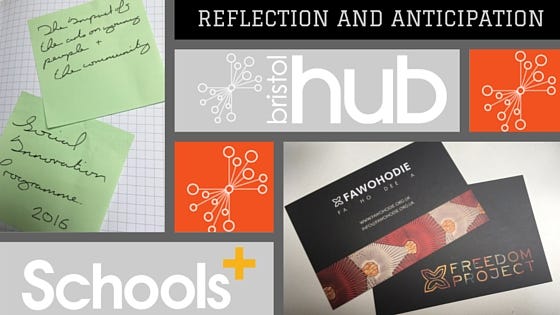Lily shares what she has learnt from her experience volunteering with Bristol Hub and discusses her role as Press and Communications Coordinator. Part of our Reflection and Anticipation feature.

This year I decided to get involved with Bristol Hub, motivated by an interest in volunteering. I was interested in giving, entirely unaware of the ways in which Bristol Hub would give to me.
I volunteered with Schools Plus, tutoring GCSE English Language students in first term and GCSE Mathematics students in second term. I also took part in the Social Innovation Programme, where students work in small teams on a consultancy project for a social action organisation.
Being involved with Bristol Hub has been invaluable. I have learnt skills that I didn’t even know existed and feel much more comfortable in approaching new tasks. I also have a much deeper understanding of issues I care about.
In my role as Press and Communications Coordinator my focus will be on ensuring that more students are aware of the abundance of opportunities available through Bristol Hub. I also hope to encourage volunteers across the university to tell their stories.
For now, I have listed three key lessons I have learnt from my year with Bristol Hub.
1. Volunteering makes a real difference.
As soon as I began volunteering with Schools Plus I realised that being tutored could be transformative. As a tutor I saw first hand the ways in which my input had improved the confidence and attainment of the pupils I taught. There have been various points where pupils have told me that being tutored has helped their learning.
Statistics concerning inequality in higher education are troubling. Being involved with Schools Plus has been an excellent opportunity to use my education to help tackle educational disadvantage.
Schools Plus tutors play a vital role in improving GCSE grades, explaining content that might be the difference between a C and a D. Working in small groups also encourages academic curiosity, pivotal in a pupil’s decision to pursue higher education.
2. The challenge is worth it.
Whilst completing the Social Innovation Programme, there were points at which the tasks we had undertaken felt overwhelming.
We had to balance undertaking primary research, consolidating secondary research, organising our report’s structure, planning a presentation, and actually writing our report. On reflection, most of the difficulty we had could have been solved by better time management!
Our hard work was worth it. I believe our team achieved a lot and I learnt a lot of interesting new things along the way. Our report was on the power of art and I discovered a lot of fascinating information about the impact of art on the brain!
Our team was left with the satisfaction that we had produced a document which would be really useful to the organisation we worked with.
3. People are always trying to help others.
The reporting of current affairs oscillates between tumultuous international relations, poverty, injustice, and violence. In such a context, it is unsurprising that many embrace pessimism and accept that suffering is an unfortunate, but inherent reality.
Taking part in the Social Innovation Programme put me into contact with Freedom Project, the organisation we produced our report for. Freedom Project work in the UK to empower disadvantaged young people through the arts and on farming in Ghana. Being given the opportunity to work with Freedom Project reminded me that, for all of the bad in the world, there are always people who dedicate their lives to helping others.
As well as organisations dedicated to helping people, Bristol Hub taught me that the university is full of students that want to volunteer and help others. We needn’t fall into thinking everything is futile. Innovation is used across the globe for the cause of social action. Freedom Project’s clothing label, Fawohodie, exemplifies this use of entrepreneurship for good.
